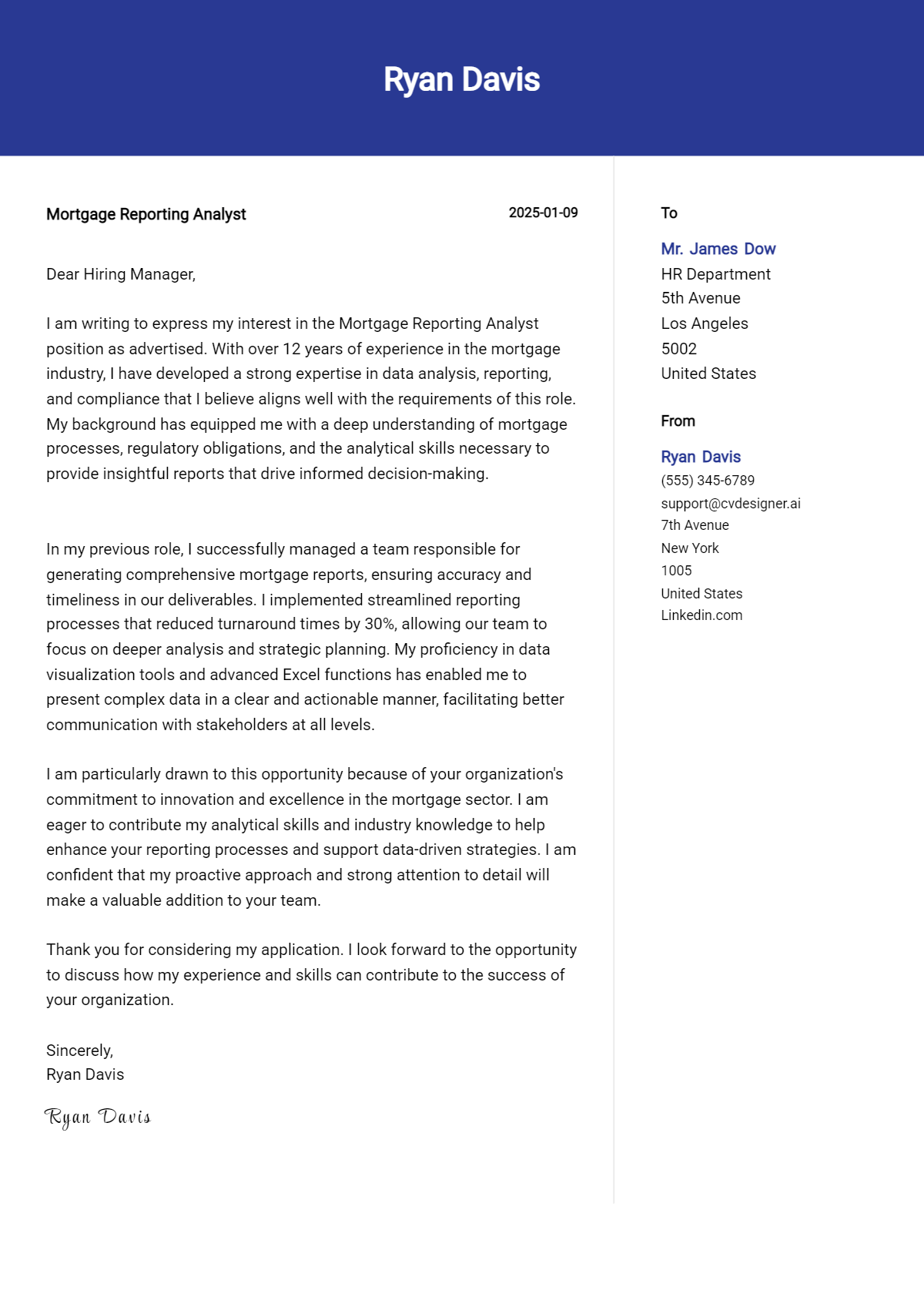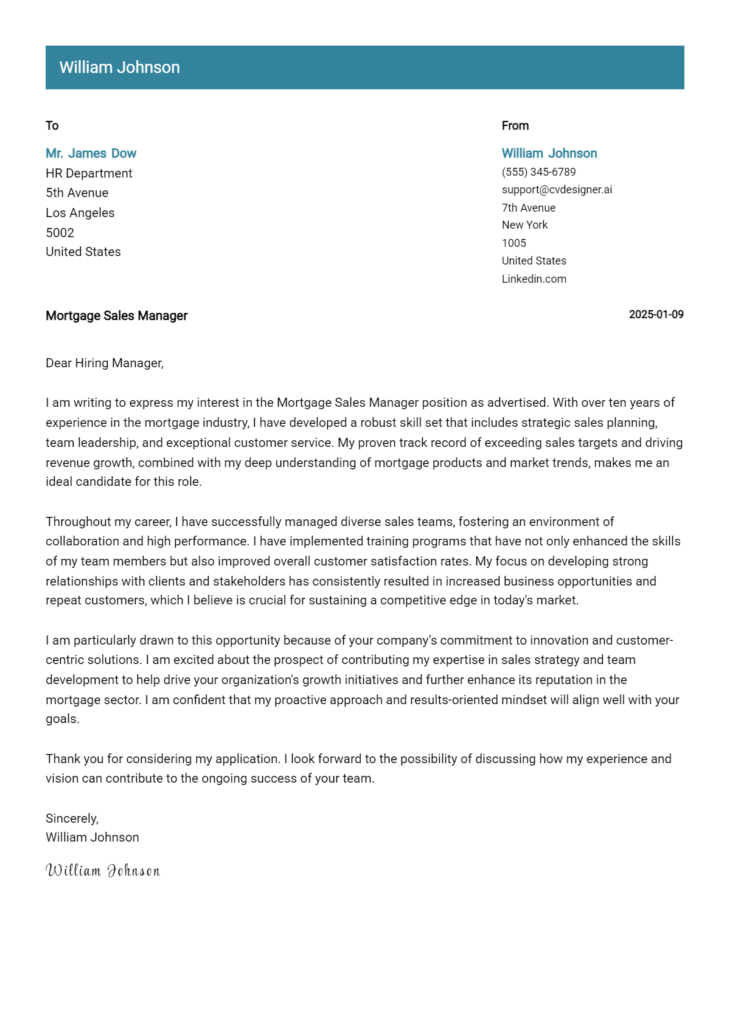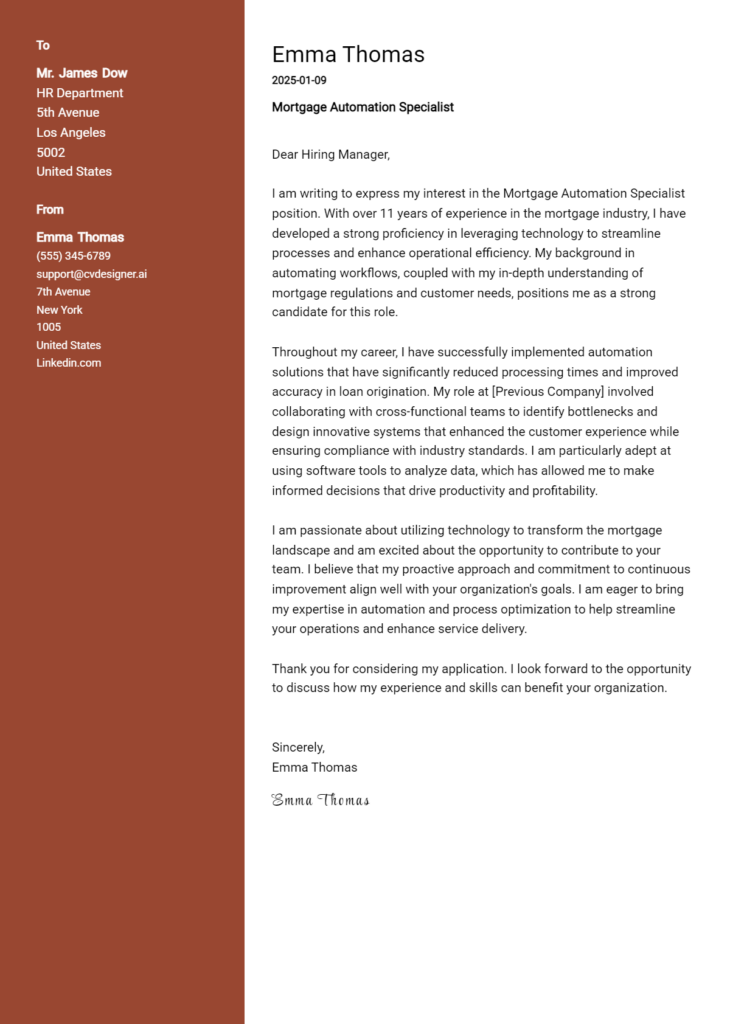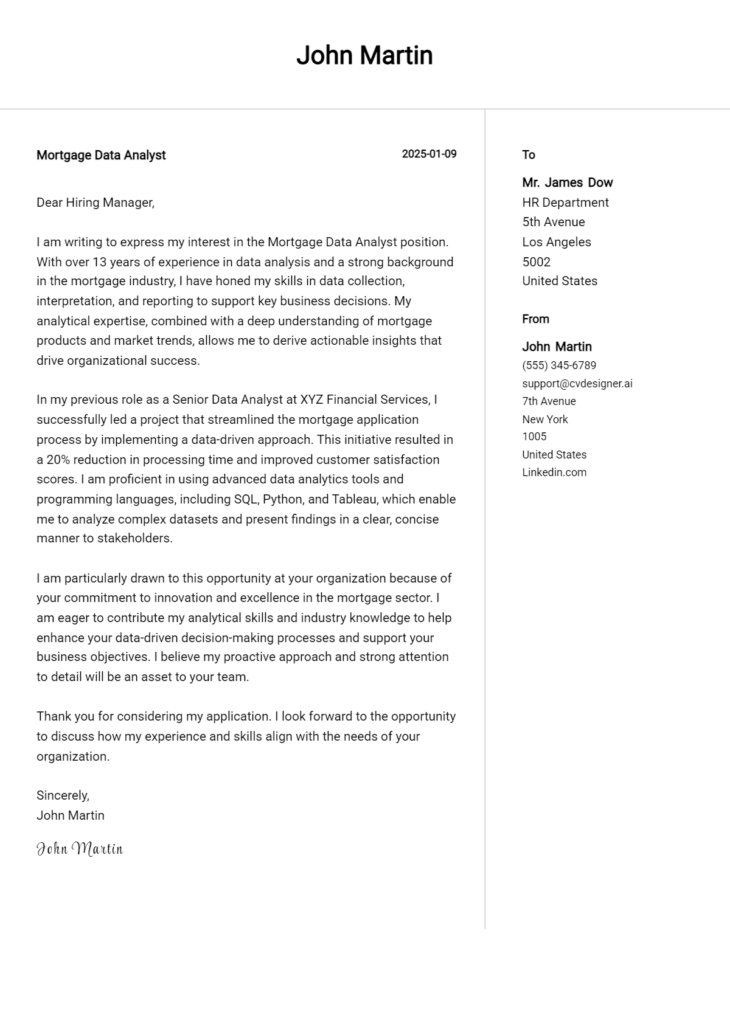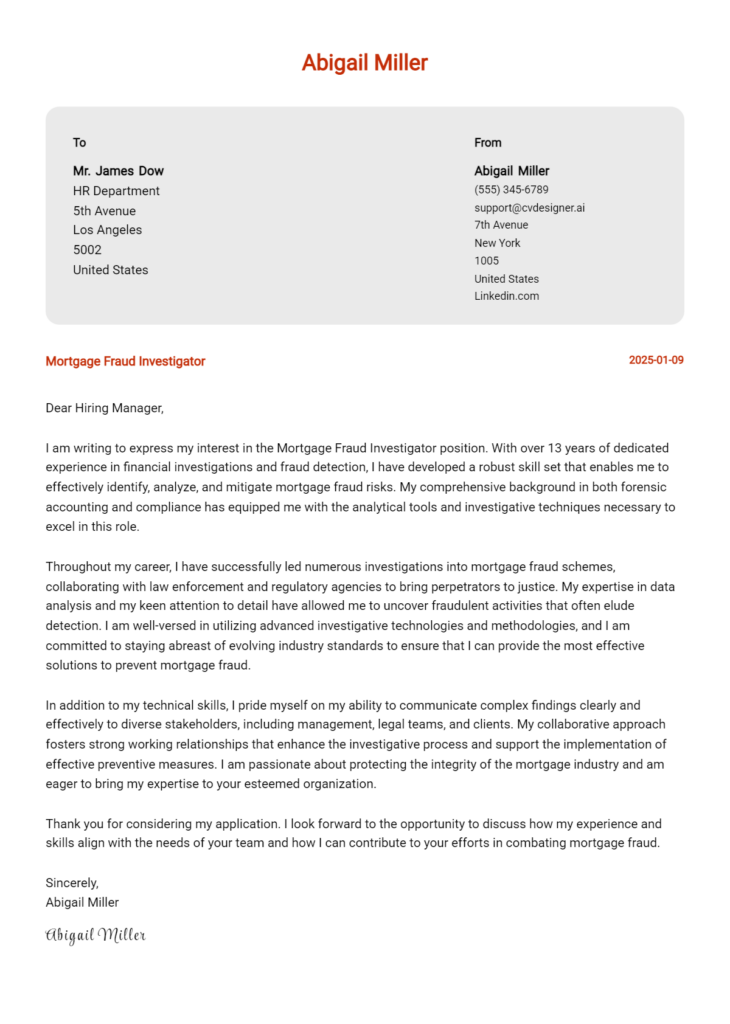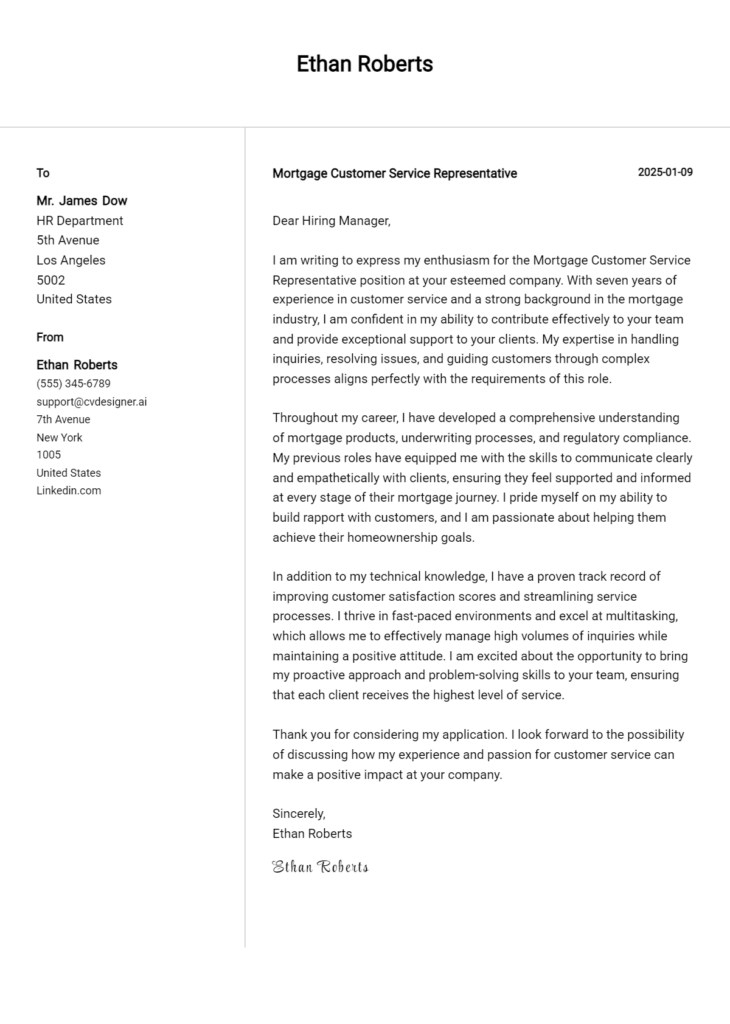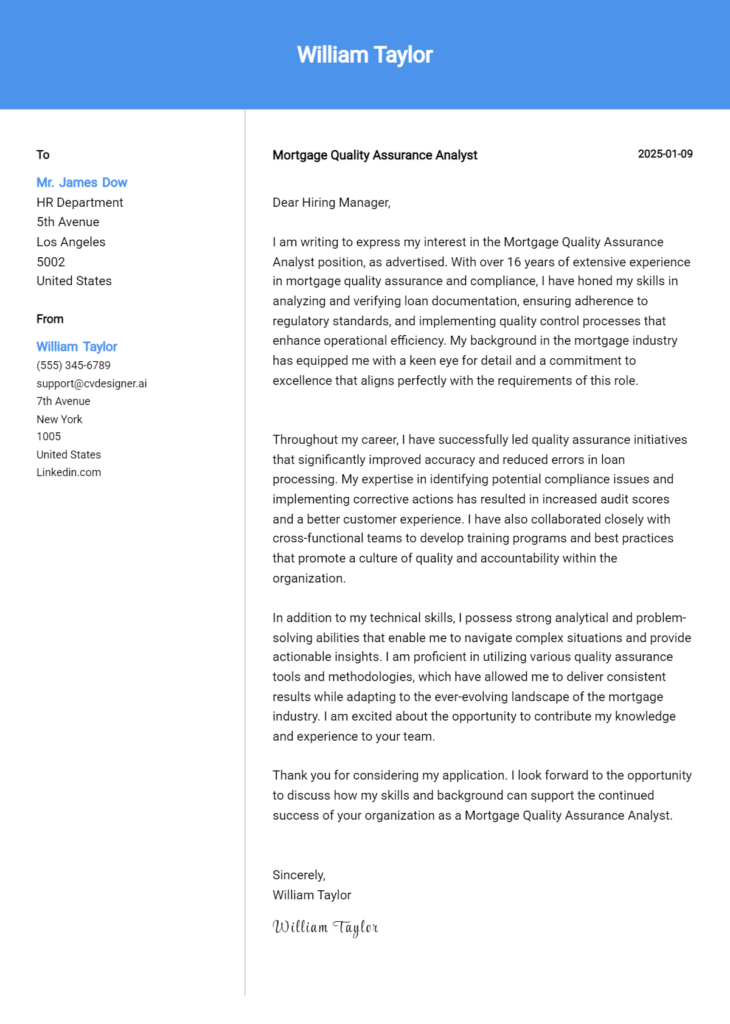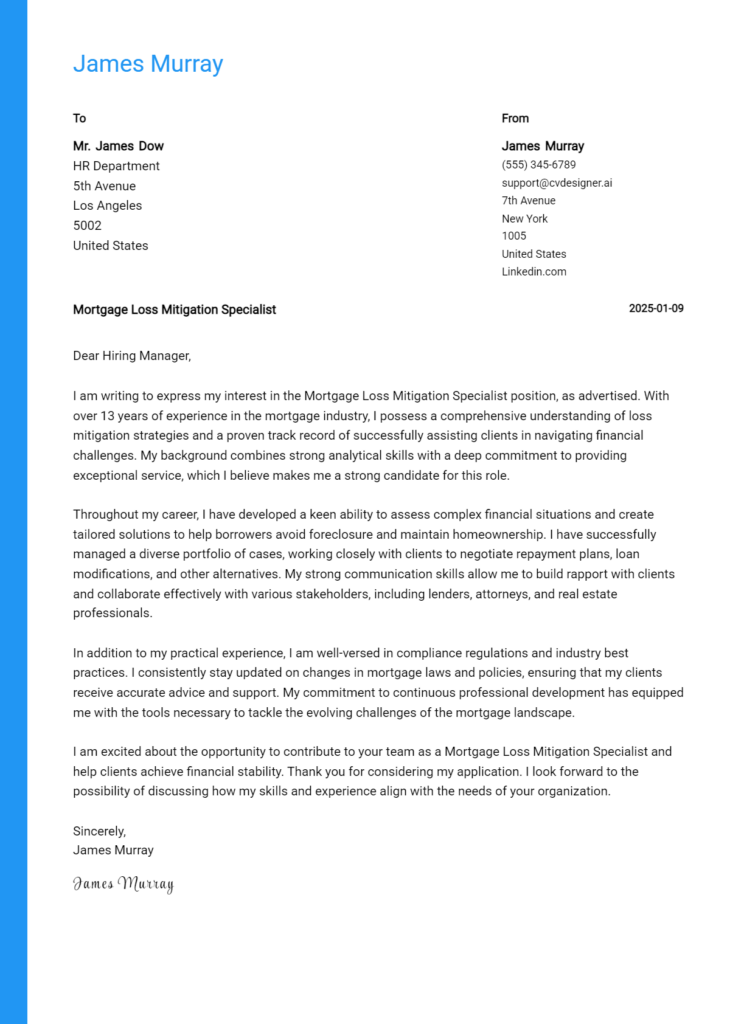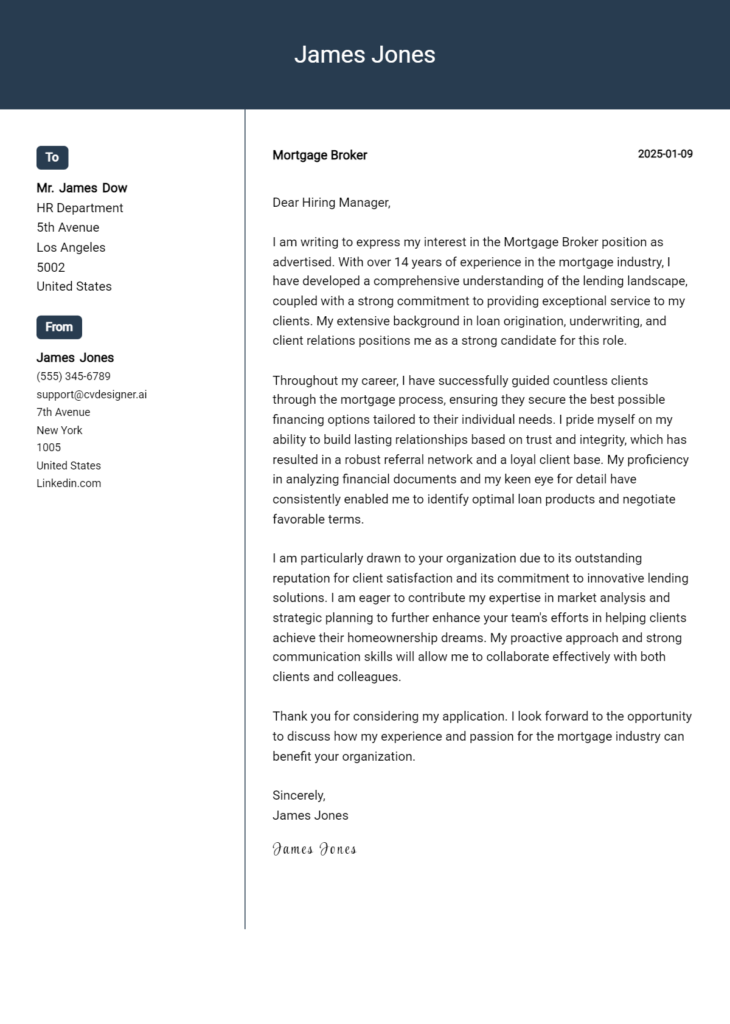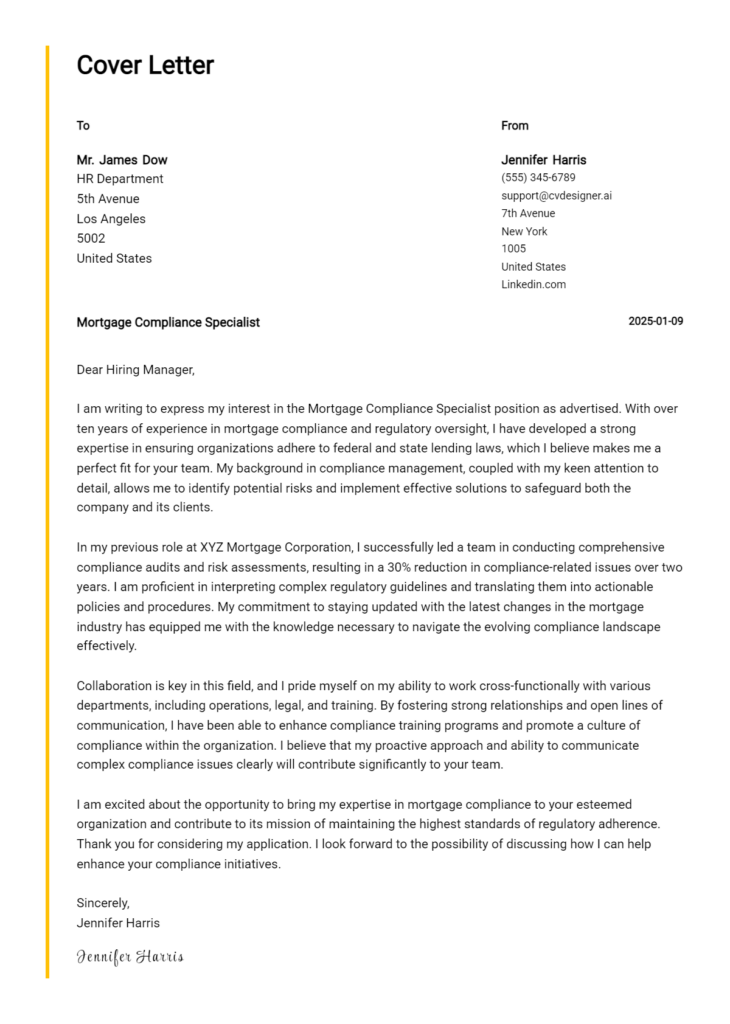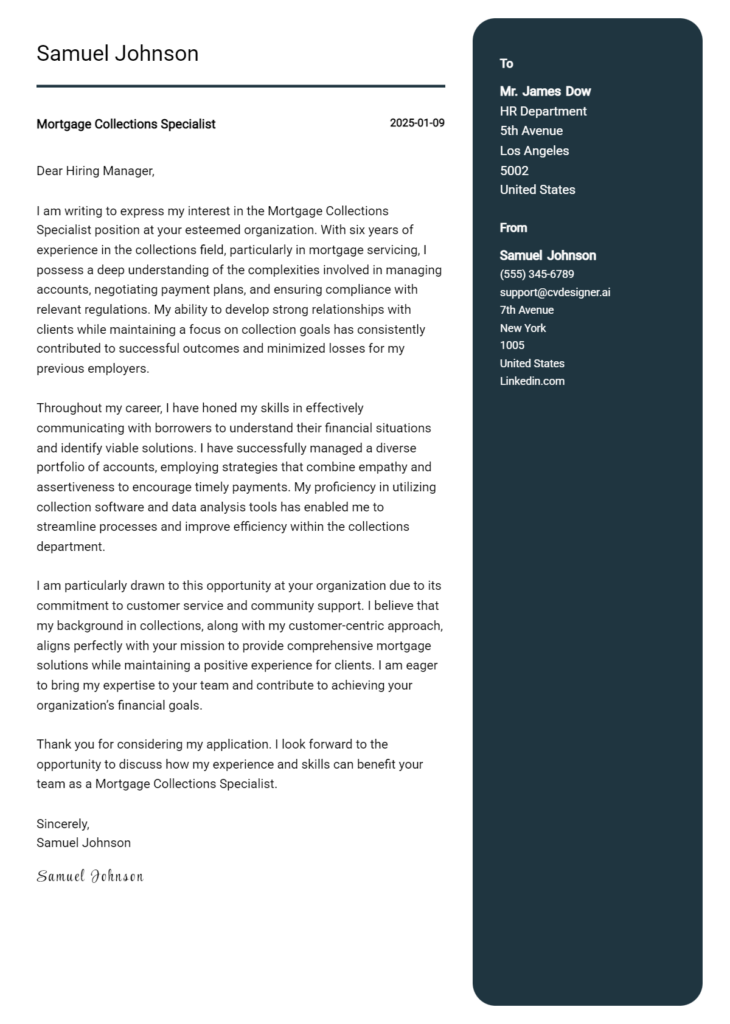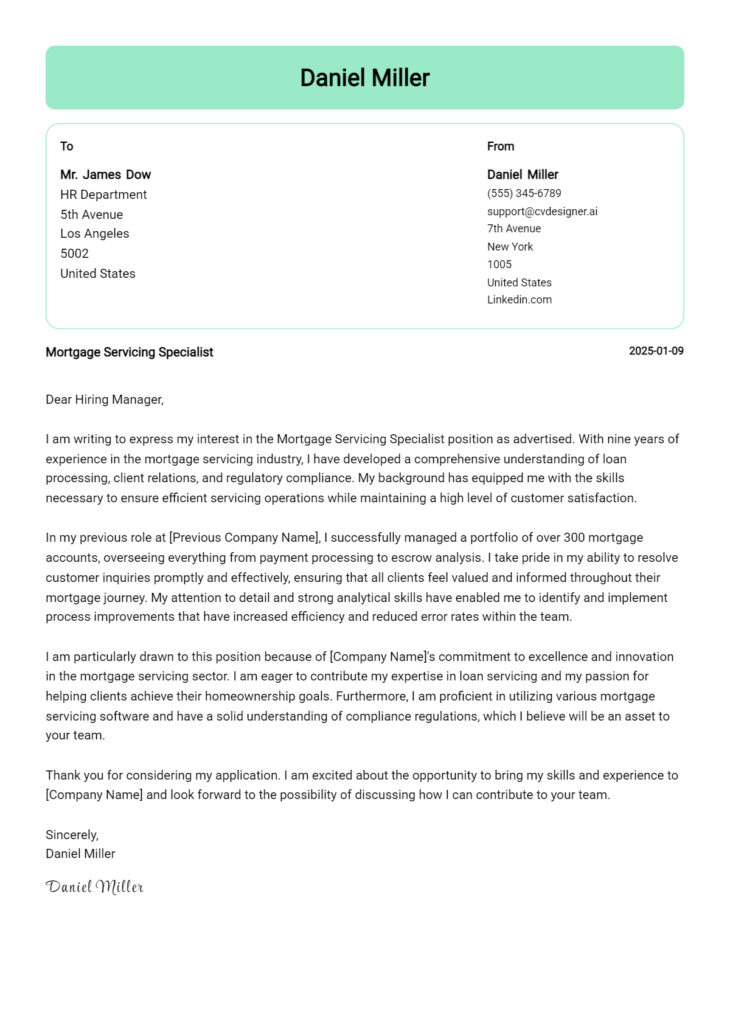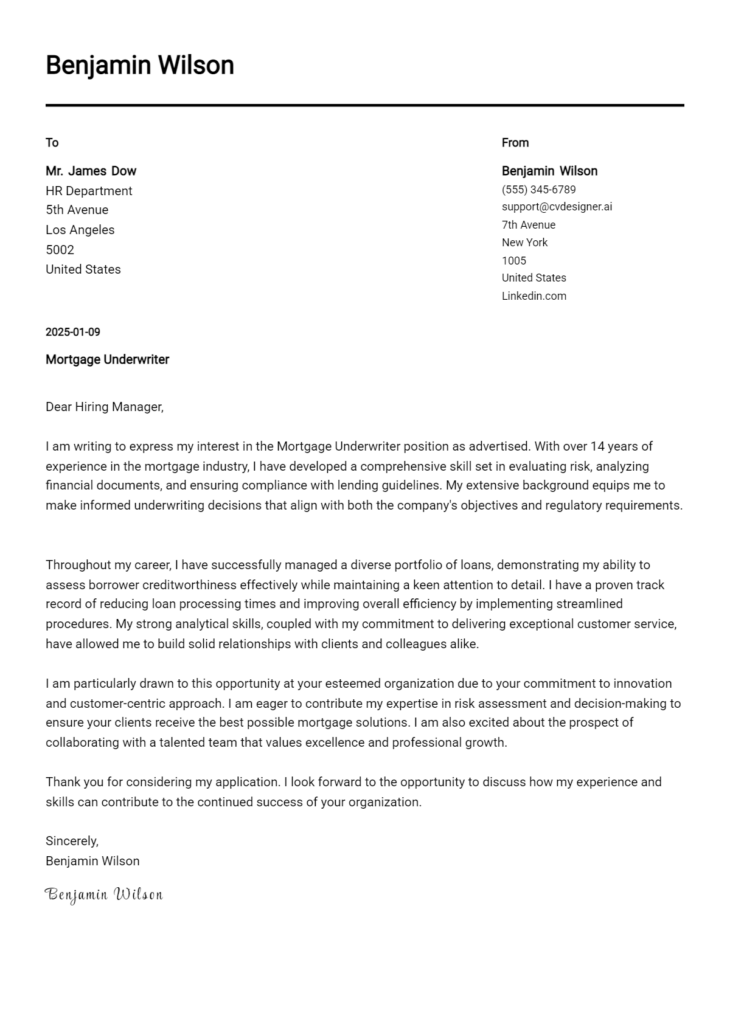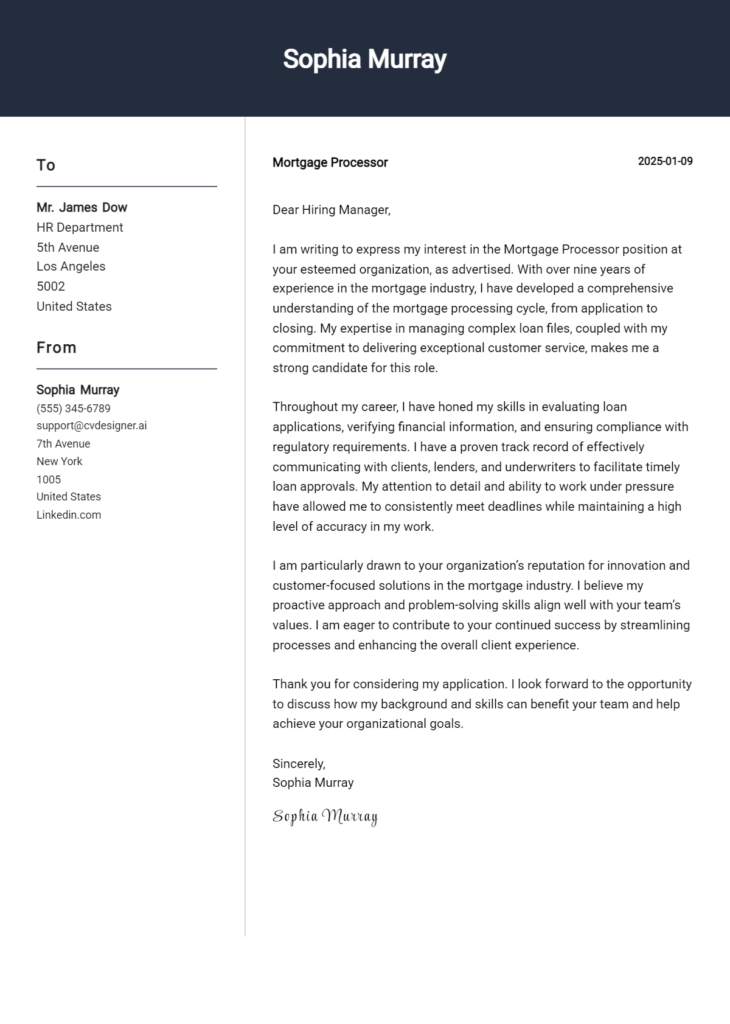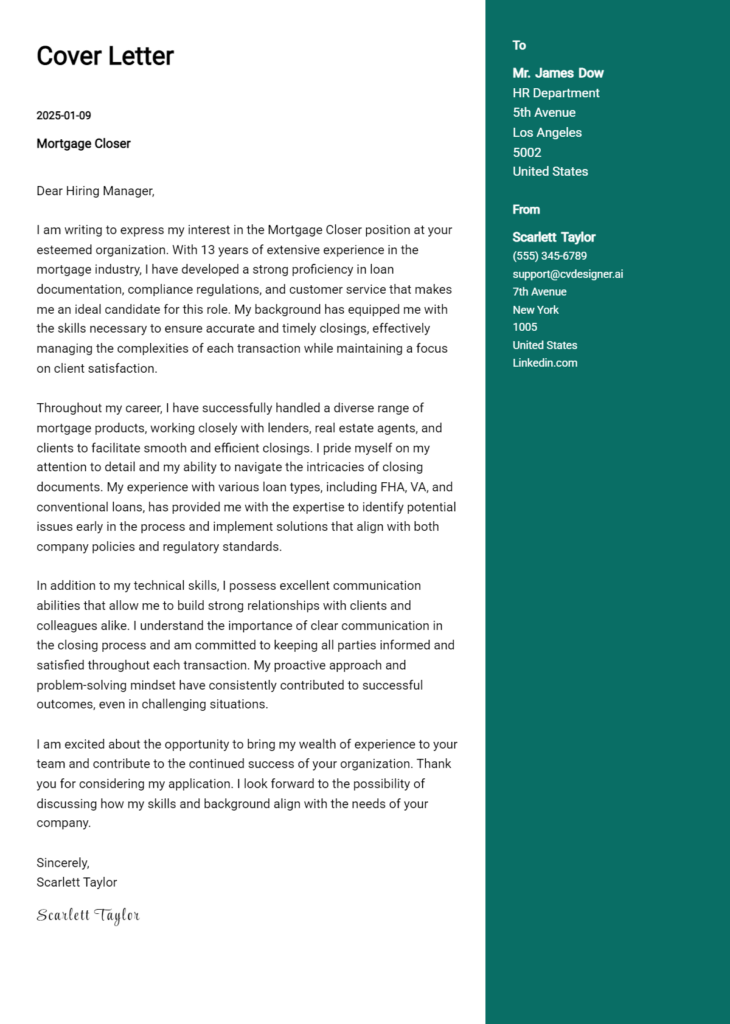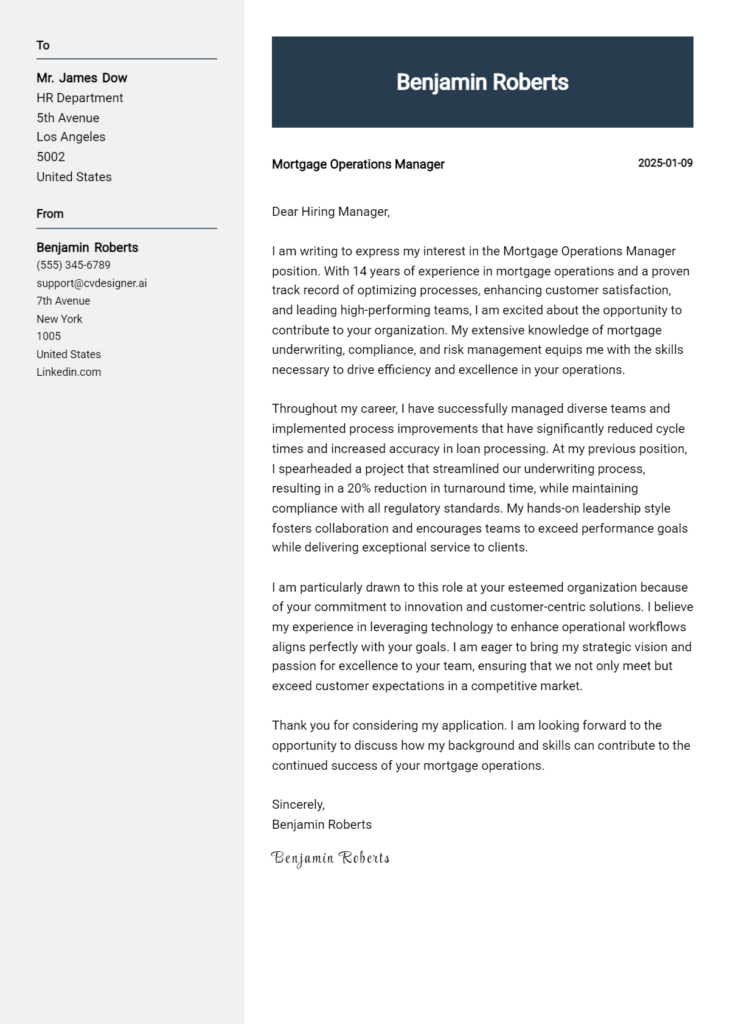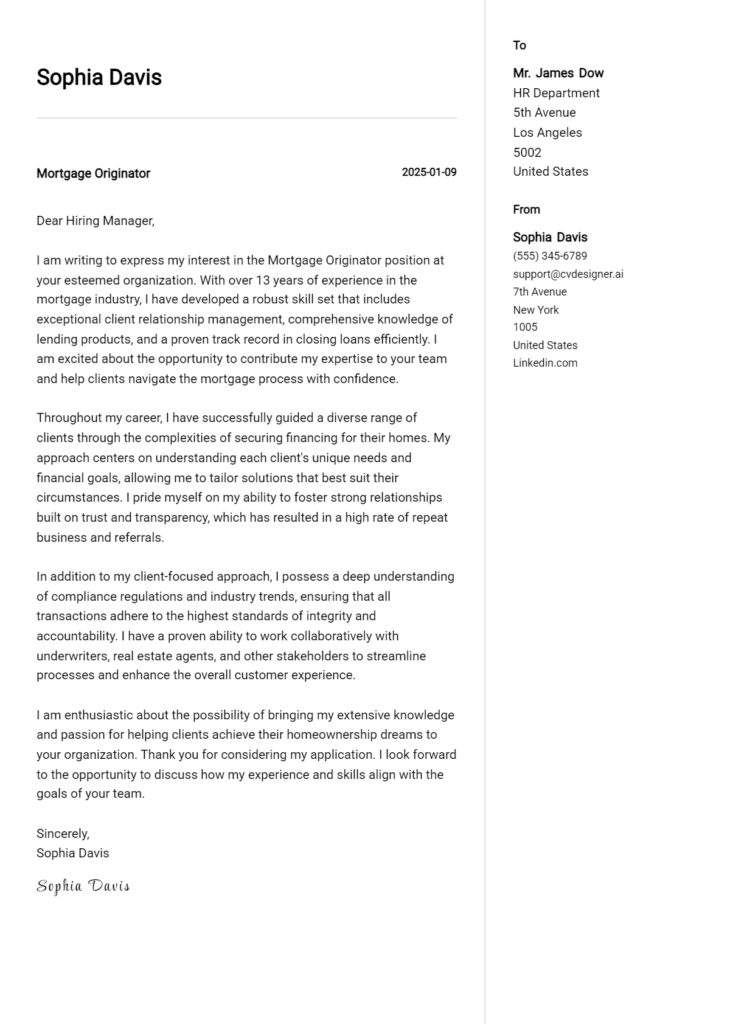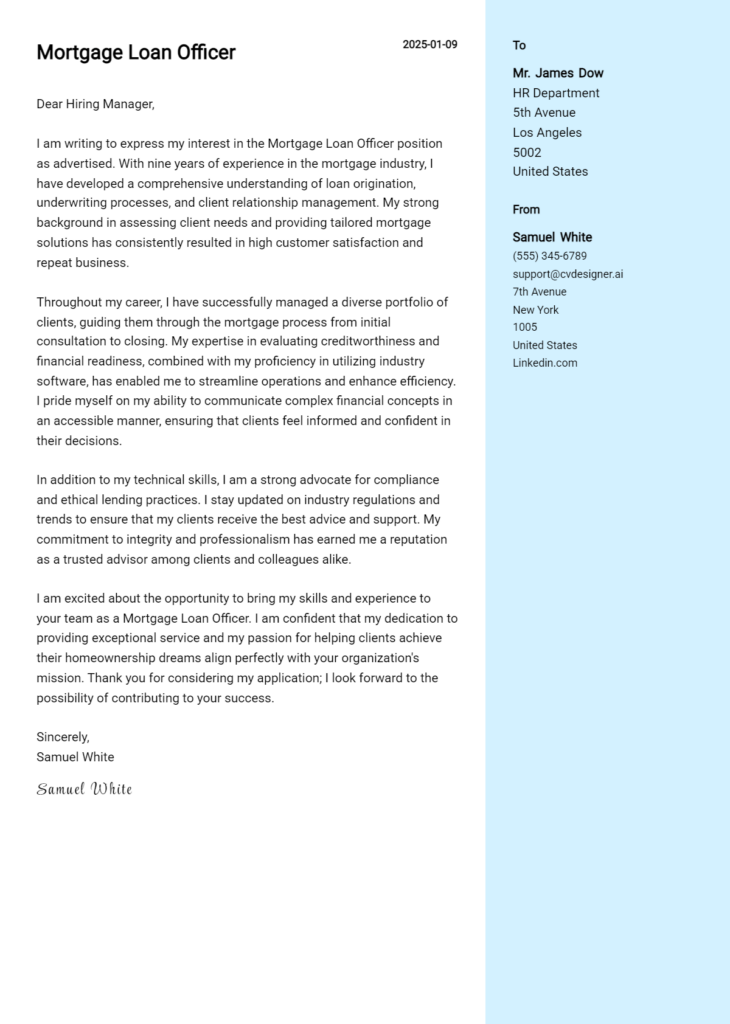Mortgage Reporting Analyst Cover Letter Examples
Explore additional Mortgage Reporting Analyst cover letter samples and guides and see what works for your level of experience or role.
How to Format a Mortgage Reporting Analyst Cover Letter?
Crafting a compelling cover letter is essential for a Mortgage Reporting Analyst as it serves as your first impression on potential employers. The way you format your cover letter not only reflects your qualifications but also showcases your analytical abilities and attention to detail—traits that are crucial in the mortgage and finance sectors. A well-structured cover letter can effectively capture the hiring manager's interest, demonstrating your professionalism and commitment to precision.
In this guide, we will explore how to structure your cover letter, providing insights and mortgage-specific examples to help you create an impactful document.
We will focus on the key components of a professional cover letter, including:
- Cover Letter Header
- Cover Letter Greeting
- Cover Letter Introduction
- Cover Letter Body
- Cover Letter Closing
Every section is vital in presenting your qualifications and professionalism. Let’s dive into each part and discover how to make your Mortgage Reporting Analyst cover letter shine.
Importance of the Cover Letter Header for a Mortgage Reporting Analyst
The cover letter header is a critical element that sets the tone for the entire document. It provides essential information that allows the recipient to identify the sender and understand the context of the application. For a Mortgage Reporting Analyst position, the header should include the applicant's contact information, the date, and the recipient's details, ensuring clarity and professionalism. A well-structured header can create a positive first impression, while a poorly formatted one may detract from the applicant's overall message.
A strong header reflects attention to detail, which is vital in the mortgage industry, where accuracy and precision are paramount. In contrast, a weak header may suggest carelessness or a lack of understanding of professional standards.
Strong Example
John Doe 123 Main Street City, State, Zip Code john.doe@email.com (123) 456-7890 [Date] Hiring Manager Company Name 456 Business Rd. City, State, Zip Code
Weak Example
John johndoe@gmail.com July 2023 Manager XYZ Corp
The Importance of a Strong Cover Letter Greeting
The greeting of a cover letter serves as the first impression for both the applicant and the employer, establishing the tone for the entire document. A well-crafted greeting not only conveys professionalism but also demonstrates a level of personalization that can set you apart from other candidates. By directly addressing the hiring manager, you show that you have taken the time to research and understand the company and its culture. To avoid generic greetings that can make your application feel impersonal, take the initiative to find the recipient's name, either by checking the company's website or calling their office if necessary.
Strong Greeting Example
Dear Mr. Johnson,
Weak Greeting Example
To Whom It May Concern,
By adhering to these tips and crafting a thoughtful greeting, you enhance the likelihood of making a positive impression on the hiring manager and increase your chances of advancing in the hiring process.
Importance of a Well-Crafted Cover Letter Introduction for a Mortgage Reporting Analyst
A well-crafted cover letter introduction is crucial for standing out in the competitive job market for a Mortgage Reporting Analyst. This initial paragraph sets the tone for the entire letter, capturing the hiring manager's attention and expressing genuine interest in the role. A strong introduction not only conveys enthusiasm but also highlights key skills or achievements relevant to the position, making it easier for the reader to see the candidate's potential value to the organization. Below are examples of both strong and weak introductions to illustrate the impact of effective writing.
Strong Example
Dear [Hiring Manager's Name], I am excited to apply for the Mortgage Reporting Analyst position at [Company Name], where I can leverage my expertise in data analysis and financial reporting to drive informed decision-making. With over five years of experience in mortgage analytics and a proven track record of improving reporting accuracy by 30%, I am eager to contribute to your team and help optimize your reporting processes for enhanced operational efficiency.
Weak Example
To Whom It May Concern, I would like to apply for the Mortgage Reporting Analyst job. I have some experience in finance, and I think I could do well in this role. I hope to share more about myself in this letter.
Purpose of the Cover Letter Body for a Mortgage Reporting Analyst
The cover letter body for a Mortgage Reporting Analyst serves as a critical platform for candidates to articulate their relevant skills, experiences, and the unique value they bring to the organization. This section should effectively highlight specific projects or accomplishments that demonstrate the candidate's ability to analyze mortgage data, generate insightful reports, and support strategic decision-making. A strong cover letter body not only reflects the candidate's technical proficiency in financial analysis and reporting tools but also showcases their problem-solving skills and attention to detail, which are essential in the mortgage industry. By doing so, candidates can create a compelling narrative that aligns their expertise with the needs of the employer, ultimately improving their chances of securing an interview.
Strong Example
Dear [Hiring Manager's Name], I am excited to apply for the Mortgage Reporting Analyst position at [Company Name]. In my previous role at [Previous Company], I successfully led a project that streamlined the mortgage reporting process, reducing report generation time by 30%. This was achieved by implementing automated data extraction techniques and utilizing advanced Excel functions, which not only enhanced accuracy but also provided timely insights for upper management. Additionally, I collaborated with cross-functional teams to identify key performance indicators, enabling us to pivot strategies that improved loan processing efficiency by 20%. I am eager to bring my analytical skills and a proven track record of optimizing reporting processes to [Company Name] and contribute to your team's success. Sincerely, [Your Name]
Weak Example
Dear [Hiring Manager's Name], I want to apply for the Mortgage Reporting Analyst job at [Company Name]. I have some experience working with data and reporting. In my last job, I did some reporting tasks and used Excel. I think I would be a good fit because I am detail-oriented and can follow instructions. I hope to be part of your team and help out. Best, [Your Name]
Importance of the Cover Letter Closing for a Mortgage Reporting Analyst
The closing paragraph of a cover letter is crucial as it serves to summarize your qualifications, reiterate your enthusiasm for the position, and encourage the reader to take the next step, such as reviewing your resume or scheduling an interview. A strong closing leaves a lasting impression and reinforces your fit for the role, while a weak closing can diminish the impact of the entire letter. Here are examples of both:
Strong Example
Thank you for considering my application for the Mortgage Reporting Analyst position. With my extensive experience in mortgage data analysis and my keen attention to detail, I am confident in my ability to contribute effectively to your team. I am enthusiastic about the opportunity to leverage my skills at [Company Name] and help drive data-driven decision-making. I look forward to discussing my application further and would appreciate the chance to speak with you about how I can support your reporting needs. Please feel free to reach out to schedule an interview at your convenience.
Weak Example
Thanks for reading my cover letter. I hope you like my resume. If you want to talk about the job, maybe we can set up a time to chat.
These tips will help candidates craft an effective cover letter for a Mortgage Reporting Analyst position by emphasizing the key skills and experiences that potential employers value. In this competitive field, it’s crucial to showcase your technical skills, problem-solving abilities, understanding of the Software Development Life Cycle (SDLC), teamwork capabilities, and a genuine passion for continuous learning. A well-structured cover letter can set you apart from other candidates and highlight your unique qualifications.
Tips for Crafting an Effective Cover Letter
Highlight Technical Skills
Clearly outline your technical expertise related to mortgage reporting, such as proficiency in data analysis tools (e.g., SQL, Excel) and reporting software. Mention any specific technologies or languages you are familiar with, as this shows your ability to handle the technical aspects of the role.Demonstrate Problem-Solving Abilities
Use specific examples to illustrate your problem-solving skills. Describe a challenging situation you faced in a previous role and explain how you approached the challenge, the actions you took, and the results you achieved. This not only highlights your analytical skills but also showcases your ability to contribute positively to the team's success.Showcase SDLC Knowledge
Discuss your understanding of the Software Development Life Cycle (SDLC) as it relates to mortgage reporting processes. Mention any experience you have working on projects that required you to collaborate with developers or contribute to software development. This indicates your familiarity with the processes and your ability to work effectively in a structured environment.Emphasize Teamwork and Collaboration
Convey your ability to work well within a team by sharing experiences where collaboration was key to achieving a project’s goals. Highlight any roles you played in group projects, how you interacted with colleagues, and how your contributions supported the overall success of the team.Express a Passion for Continuous Learning
Highlight your commitment to ongoing professional development by mentioning any relevant certifications, workshops, or courses you have completed or are currently pursuing. This demonstrates your eagerness to stay updated with industry trends and continuously improve your skill set, making you a more valuable asset to potential employers.
For additional help in crafting your cover letter, check out these cover letter templates and consider using a cover letter builder to streamline the process and ensure a polished, professional presentation.
Common Mistakes to Avoid in a Mortgage Reporting Analyst Cover Letter
Crafting a compelling cover letter is essential for standing out in the competitive field of mortgage reporting analysis. Avoiding common mistakes can significantly enhance your chances of securing an interview. Here are some pitfalls to watch out for:
Generic Greeting: Starting with "To Whom It May Concern" can make your letter feel impersonal. Instead, address the hiring manager by name if possible.
Lack of Specificity: Failing to mention specific skills or experiences relevant to the mortgage reporting role can weaken your application. Tailor your content to highlight your expertise in data analysis and reporting.
Overly Lengthy: A cover letter should be concise. Aim for a maximum of one page. Use clear, direct language to convey your points effectively.
Typos and Grammatical Errors: Mistakes can create a negative impression. Always proofread your letter or use tools to help catch errors before submitting.
Repetition of the Resume: Avoid reiterating what’s in your resume. Instead, use the cover letter to expand on key experiences or to demonstrate your passion for the mortgage industry.
Neglecting the Format: A cluttered or unprofessional layout can detract from your message. Follow a clear cover letter format to maintain readability.
Lack of a Call to Action: Ending without a proactive statement can leave the reader unengaged. Express your enthusiasm for the role and suggest a follow-up.
By steering clear of these common errors and focusing on a well-structured, tailored approach, you can create a powerful cover letter that makes a lasting impression. For inspiration, check out these cover letter examples to help you get started!
Cover Letter FAQs for Mortgage Reporting Analyst
What should I include in my cover letter for a Mortgage Reporting Analyst position?
In your cover letter, focus on showcasing your analytical skills, attention to detail, and knowledge of mortgage reporting standards. Start with a strong introduction that highlights your interest in the role and the company. Discuss your relevant experience in mortgage reporting, data analysis, and any specific software or tools you are proficient in, such as Excel or SQL. Emphasize your ability to interpret data and generate actionable reports that support decision-making. Additionally, mention any certifications or educational background related to finance or analytics. Conclude with a strong closing statement that reiterates your enthusiasm for the position and invites further discussion.
How can I make my cover letter stand out?
To make your cover letter stand out, tailor it to the specific job and company you are applying to. Start by researching the company’s culture, values, and any recent projects or initiatives they’ve undertaken in mortgage reporting. Use this information to align your skills and experiences with their needs. Include quantifiable achievements, such as improving reporting accuracy by a percentage or reducing processing time. Use a professional yet engaging tone to convey your passion for the field. Lastly, proofread your letter for grammatical errors and ensure it is concise and well-structured to leave a strong impression.
Should I address my cover letter to a specific person?
Yes, addressing your cover letter to a specific person can make a positive impression. It shows that you have taken the time to research the company and are genuinely interested in the position. If the job listing does not provide a name, you can check the company’s website, LinkedIn, or call the HR department to ask for the hiring manager's name. If you cannot find a specific individual, you can use a general title such as "Hiring Manager" or "Recruiting Team." However, a personalized greeting is always preferred, as it adds a personal touch to your application.
How should I format my cover letter for clarity and professionalism?
To ensure your cover letter is clear and professional, use a standard business format. Start with your contact information at the top, followed by the date and the employer's contact information. Use a formal greeting, and maintain a professional font such as Arial or Times New Roman in size 10-12. Structure your letter into clear paragraphs: an introduction, one or two body paragraphs detailing your qualifications, and a conclusion. Use bullet points to highlight key achievements or skills if necessary. Ensure there is sufficient white space to enhance readability, and always end with a professional closing statement, such as “Sincerely” or “Best regards.”
Build your Cover Letter in minutes
Use an AI-powered cover letter builder and have your letter done in 5 minutes. Just select your template and our software will guide you through the process.

